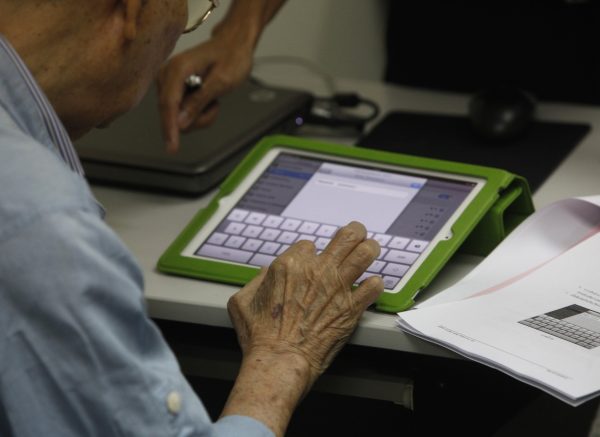The ASEAN Community Vision 2025 embraces digitalisation, including the development of a Digital Integration Framework Action Plan by 2020. It is imperative that ASEAN prioritises the digital literacy of its people as a fundamental element of enabling full participation in the ASEAN Community.
Digital literacy is, at its heart, a person’s ability to locate, discuss and share information in the digital world. Those who are not digitally literate or lack access risk marginalisation in societies that are increasingly defined by digital technologies. Many businesses, including banks, are now forgoing physical branches and opting to deliver services through digital means such as mobile applications. Less digitally literate groups may also have a harder time discerning whether content on social media and other websites is authentic.
This predicament can be avoided by putting digital literacy at the forefront of the policy agenda. An inclusive ASEAN Community is not just about creating opportunities for early adopters or specific skilled groups. Real inclusion invites everyone to feel comfortable and confident that they belong in and can contribute to the ASEAN Community. Governments of each ASEAN member state play an important role in enabling digital literacy and empowering their citizens with the requisite skills, knowledge and capacity.
Varying levels of economic development in ASEAN result in different levels of public education and outreach capabilities, which means there is no one-size-fits-all solution to achieving digital literacy. Each ASEAN member state would also have different opportunity statements and target groups to ensure that the most vulnerable populations have priority in receiving digital literacy training.
There are four fundamental components to embedding digital literacy that apply to all ASEAN countries: basic competency in using digital devices and accessing online resources; skills to evaluate the credibility and authenticity of online information; mindfulness around what information is appropriate to share online; and basic awareness of what constitutes safe online behaviour. Being deficient in any of these elements is detrimental to the goal of universal digital literacy and makes the ASEAN Community less informed.
Public sector agencies such as the Thai Electronic Transactions Development Agency and the Bank of Thailand are already actively disseminating bite-size digital literacy infographics through social media channels. Private sector companies — especially from the technology and banking industries — are approaching digital literacy as a business and security imperative and incorporating it into their customer interactions. There is significant room to build on such existing efforts to form national strategies across ASEAN. This could combine implementing programs and activating partnerships in the public and private sector.
The first recommended step towards digital literacy is that ASEAN member states should start incorporating digital literacy into primary and secondary school curricula to reach first-time digital users with the long-term aim of empowering people for lifelong learning. The National Bank of Cambodia and the Cambodian Ministry of Education, Youth and Sport set a remarkable and bold example in 2019 for Southeast Asia by taking this approach for financial literacy. What is also crucial to this process is to ensure teachers receive adequate training to execute this digital shift.
Next, governments can define specific follow-up programs to reach communities who require further digital literacy training and help them understand how digitalisation will affect and improve the way they live. For example, workforce digital upskilling programs are tangible and productive initiatives that can generate economic and social value. The Info-communications Media Development Authority of Singapore has developed a strong roster of such programs.
Most importantly, the rapid pace of change in technology means that relearning and upskilling will likely be the norm for the ASEAN digital community. It is important to ensure that the educational material evolves over time and is in line with emerging technologies. Governments can lean on the private sector to assist with content development and delivery.
There are also opportunities for a regional ASEAN action plan on digital literacy. This is necessary because a lack of coordination could lead to uneven progress across ASEAN member states, risking widening the digital divide further.
A do-nothing approach on the part of governments is not suitable. It would be irresponsible to count on social or market forces alone to upskill all ASEAN citizens in digital literacy. This is especially true for groups with accessibility issues such as seniors, people living with disabilities, rural populations, women and the intergenerationally poor. Taking targeted and systematic action nationally and combining it with regional coordination and experience-sharing is the right approach.
Important work is already underway to connect the ASEAN Economic Community. Establishing economic connectivity is valuable but should be coupled with promoting digital literacy.
Realising the ASEAN Community means empowering people to make informed decisions and live fulfilling lives. Digital literacy represents one step towards that future.
Daniel Wu is an Asia Pacific public policy advocacy professional based in Bangkok. He can be reached at [email protected].

